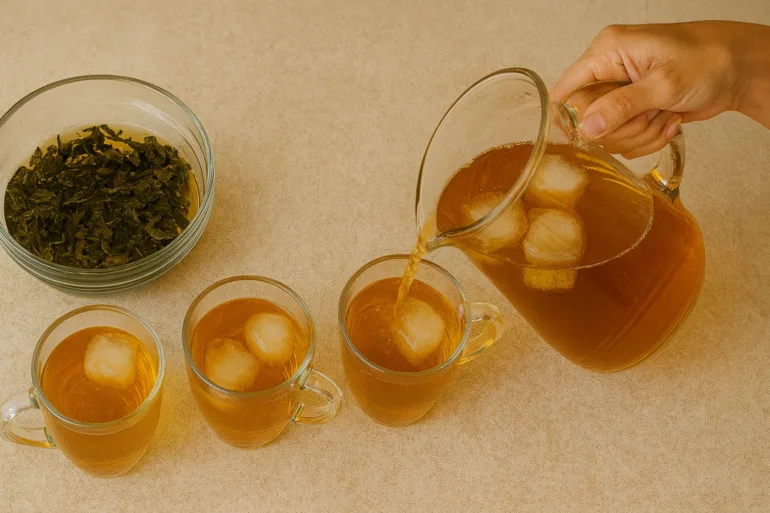Natural collagen boosters?! Did you know that the most luxurious beauty treatment can actually cost less than a takeaway coffee? While the shelves are bursting at the seams with “anti-aging” serums, as expensive as a weekend in Tuscany, nature discreetly smiles and beckons: it's time for tea. Not the kind for a cold, but a “beauty elixir” – a cup that you sip three times a day to help your skin maintain its firmness, radiance and good taste for life.
Below – three teas that are natural boosters collagen, plus precise preparation tricks, a mini routine throughout the day, and a couple of sensible warnings to make sure the ritual works as well as it looks.
Why are we talking about collagen? Natural collagen boosters?
Collagen is like the inner bra of your face: when there is enough of it, everything is in place, when there is not, gravity has too much fun. As we age, it is naturally produced less, and it is "bitten" more quickly by free radicals (oxidative stress) and certain enzymes (collagenases, elastases). Antioxidants and smart habits help preserve what is yours - without needles and dramatic effects.
Note for the curious: Research shows that tea polyphenols can partially inhibit enzymes that break down collagen/elastin and protect cells from oxidative stress.
1. White tea – the silent anti-aging hero
Why it works: White tea is the least processed tea leaf, so it remains rich in polyphenols (catechins), which neutralize free radicals. In in-vitro studies, white tea extracts have shown potential inhibition of elastase and collagenase – enzymes that break down skin structures. This translates into better firmness support and less visible fine lines.
How to prepare it:
- Water: 70–80°C (so as not to "cook" the tender leaves).
- Soak 2–3 minutes.
- Drink in the morning – this is your subtle beauty filter with a little caffeine.
Little trick: Add a slice of pear or a pinch of lemon zest. Elegant and cosmopolitan – without too much acidity.

2. Rooibos – red zen for renewal
Why it works: Rooibos (Aspalathus linearis) is caffeine-free and rich in unique flavonoids such as aspalathin and nothofagin, which have antioxidant and soothing effects. This is good news for skin prone to redness and minor inflammation – less irritation means a more satisfied barrier function and appearance. Natural collagen boosters – and first on the list.
How to prepare it:
- Water: 95–100°C.
- Soak 5-7 minutes (the length suits rooibos).
- Afternoon or evening – Zen in a cup, without shaking hands.
Lifestyle idea: Rooibos latte with oat milk, a pinch of cardamom and a drop of honey. Instagram loves this color, and the skin loves peace.
3. Hibiscus – vitamin C drama queen (in a good way)
Why it works: Hibiscus (Hibiscus sabdariffa) is naturally rich in anthocyanins and is known for its content of vitamin C – key cofactors for collagen synthesis. The drink is refreshing, slightly acidic and generously hydrating.
How to prepare it:
- Hot: 90–95°C, 5–10 minutes (intense ruby color).
- Cold brew: 8–12 hours in the refrigerator – more delicate flavor and more vitamin C-friendly.
- In the evening (if the acid doesn't bother your stomach).
Top mix: Hibiscus + fresh mint + lemon + ice cubes. Summer fresh-face energy.

Mini routine during the day (3 cups, lots of beauty)
- In the morning: White tea – an antioxidant shield against the hustle and bustle of the city and blue screens.
- Afternoon: Rooibos – soothing and gentle support for regeneration.
- In the evening: Hibiscus – hydration and support for collagen synthesis during nighttime regeneration.
How much is “just right”? 2–3 cups a day is a realistic, enjoyable ritual. Don't forget the water; teas should supplement hydration, not replace it.
Three quick recipes (for gourmet souls)
-
-
- White tea “Porcelain”: white tea + 1 slice of pear + a sprig of jasmine flowers (if you have them).
- Rooibos “Sleeping Cardamom”: rooibos + oat milk + cardamom + pinch of cinnamon.
- Hibiscus “Riviera”: hibiscus cold-brew + mint + lemon + mineral with fine bubbles.
-
Smart & safe (because we're adults)
- Caffeine: White tea has less caffeine than green/black, but it does have some. The general recommendation for adults is up to ~400 mg caffeine/day from all sources (individual tolerance varies).
- Hibiscus: May affect blood pressure (slight decrease); for safety reasons, it should be used with caution. pregnant and breastfeeding mothers avoided unless otherwise advised by a doctor.
- Rooibos: Usually safe; rare cases reported of effects on liver enzymes in excessive consumption. If you have liver problems, consult your doctor.
- Reality > miracles: Teas do not replace SPF, a balanced diet, sleep, and smart topicals (e.g. retinoids, vitamin C serums). They are excellent support – elegant, every day, without drama.
Tea-flavored finish – natural collagen boosters
You don't need a lab in your bathroom. You need a cup, two minutes of silence, and a good sheet of paper. White tea like a morning filter, rooibos for afternoon zen, hibiscus for an evening glow – a ritual your skin will understand. Turn your skincare routine into a habit, not a hype, and let polyphenols, vitamins and consistency do the work.





